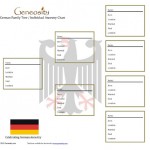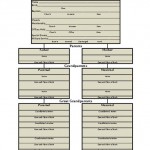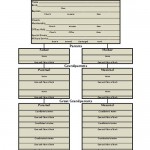Preview: Our Family Historian program is nearly complete. Below you’ll see a preview to the program – the introduction. Illustrations, photographs and precise notes on each topic yet to be extracted from each section but an overview is offered here. Your feedback and potential interest in registering for the course are appreciated. Thank you for your interest and feedback. We’re looking forward to rolling out the program soon.
Geneosity Family Historian
First of all, what is a family historian? Some are willful participants in the collection and preservation of family history and some are the chosen or default receiver of “stuff” that belonged to a family member. Genealogy is the study of family lineage that includes all available data and statistics pertaining to the line of descent of an individual or family. A family historian is the keeper of genealogical data, the keeper of artifacts such as letters, photos and other materials, and the keeper of the legacy.
Both skills go hand-in-hand with one another, and the latter isn’t much good without the former. An old letter holds little meaning unless it is understood who wrote it. The statistical name of a long passed relative comes to life with the addition of a letter penned with her hand.
Many of us have done family research for reasons of curiosity and entertainment. So many are unsure how to handle their data and artifacts so that their work will be useful to others in the future. Over and over again we come across, view, handle, document and store findings in electronic form on our computers and the physical artifacts sit in a box that spend years crumbling away in an attic, basement or a closet.
As mortal beings we hope to be remembered long after we’re gone. That’s part of human nature. If you’re the gatherer or the keeper of the facts and artifacts of your ancestors, your responsibility is clear. Save the memory of Mom and Dad, the kids, Grandma and Grandpa and their parents… as best you can so that your children, nieces and nephews, grandchildren and great-grandchildren can see and hold the items and knowledge you’ve spent part of your life gathering or obtained from other family. Your objective as a family historian is to stop the loss of family history from now moving forward.
If you seek to become an efficient family historian then you must always assume that your family history work will never be repeated by anyone as effectively as you can do it. I’ve said: “If I could have ten minutes with my great grandma”. You may someday be that great-grandma. There are many reasons why the work you’re doing today can’t be repeated as easily in the future. Many of the items you possess such as records, letters, photos and research documentation are largely irreplaceable. The intact memories of your surviving family are impossible to recover once passed.
The opinion exists that as more and more records are discovered and documented, family tree research will become easier and easier. There is some truth to this. It is far easier to locate records that are 100, 150, and 200 years old now compared with the difficulty of research even fifteen years ago. I used to write to the county courthouses and wait MONTHS for a response. Enormous amounts of data are available online and the collection increases in size constantly. Perhaps fifty years from now you’ll be able to search a single name and discover the entire family lineage. In some cases you can now, but how accurate is the data?
Your current searches must include a variety of misspellings and phonetic variants to be effective. Consider the difficulty level when you search a specific name and date range that produces 25 prety close possible matches. Now, consider two decades into the future when there will be perhaps 10x more names in these databases. Can you read Latin? Can you tell the difference between an “F” and an “S” every time you read an old document? Will your children or grandchildren know how to read or write in cursive? The answers are likely an overwhelming “NO” to most of those questions.
If you are a family historian then your work has to be treated as if you’re creating a time capsule that will be opened in 25, 50 or 150 years from now. Will your family history work last? Is your work safe from a power surge, fire, flood, storm, war, abandonment, or even a simple computer crash? It can be.
Our course will focus on the incredible responsibility of a family historian to keep and preserve data, research documentation and artifacts available for many generations. We will discuss some genealogy methodologies along with preservation methods to put you on the right track to making this all possible. The five areas of expertise needed to be an effective family historian are:
1. Genealogy: Thorough documentation, proofs, and dealing with speculative data.
2. Authoring a narrative or a family story.
3. Keeping current Data and Materials: Your currently living, growing family.
4. Methods: Preservation, Restoration, Archiving, Storage, Reproduction, Distribution
5. Storage Materials: Acid Free, uses of acid free materials, buffered, unbuffered, data storage.



